Music Educators Association of New Jersey
Serving teachers and students since 1927


At Elefante Music, 10:30 A.M., and via Zoom.
President Danette Whelan greeted the audience and introduced Annual Piano Auditions Chair Lisa Casia, director of the Young Artist Master Class Program. Lisa introduced Master Teacher Aaron Wunsch, a pianist, lecturer, and professor who is a full-time faculty member at The Juilliard School. Mr. Wunsch has performed extensively (as soloist and in ensembles) and lectured extensively in this country, in Europe, and in the Far East. He has also directed concert series and has worked with many contemporary composers. To learn more, go to: aaronwunsch.com/pianist.
Then Lisa announced each of the outstanding young artists.
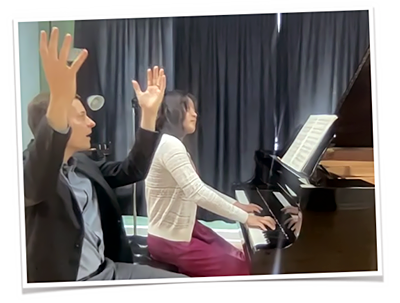 Vivian Zhang, student of Beatrice Long, performed Frédéric Chopin’s Ballade No. 3 in A Flat Major, Op. 47. “Like all the ballades, this tells a story, but I’m not telling you what it is,” Mr. Wunsch said. “What do you choose to imagine?” Vivian replied that she thinks of a grand ballroom. Mr. Wunsch said, “This makes perfect sense to me. I think of the waltz and recall a picture of Chopin playing at a ball. Dancing suggests closeness, intimacy, and romance. This is so different from the other three ballades; they are heroic epics, full of tortured emotion.” He continued: “Chopin was fond of opera. Think of this ballade’s story.”
Vivian Zhang, student of Beatrice Long, performed Frédéric Chopin’s Ballade No. 3 in A Flat Major, Op. 47. “Like all the ballades, this tells a story, but I’m not telling you what it is,” Mr. Wunsch said. “What do you choose to imagine?” Vivian replied that she thinks of a grand ballroom. Mr. Wunsch said, “This makes perfect sense to me. I think of the waltz and recall a picture of Chopin playing at a ball. Dancing suggests closeness, intimacy, and romance. This is so different from the other three ballades; they are heroic epics, full of tortured emotion.” He continued: “Chopin was fond of opera. Think of this ballade’s story.”
He demonstrated as he discussed the dramatic nature of the piece, saying that in storytelling, you do not know what will happen, so in keeping with that, you need not maintain a rigid, totally predictable rhythm. Be flexible and somewhat unpredictable as the story unfolds. Listen, and pause,...because anything can happen.
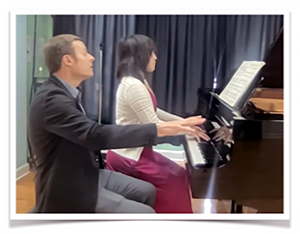 Mr. Wunsch launched into a detailed discussion of the first hundred or so measures. The comments generally pertained to maintaining the narrative of the romance and dance: the opening bars are a conversation of soprano and bass; the (m. 14) ascending chromatic scale in octaves, an amorous flirtation; the harmonies of major and minor might suggest a love problem or even anger; dynamics help us to orchestrate, to feel the waltz, and to keep the rhythmic integrity even when there are repeated keys. He suggested that when playing repeated keys, it is better to keep the fingers on the keys, preventing them from fully rising, and use a single motion to avoid using too much force on the repetitions.
Mr. Wunsch launched into a detailed discussion of the first hundred or so measures. The comments generally pertained to maintaining the narrative of the romance and dance: the opening bars are a conversation of soprano and bass; the (m. 14) ascending chromatic scale in octaves, an amorous flirtation; the harmonies of major and minor might suggest a love problem or even anger; dynamics help us to orchestrate, to feel the waltz, and to keep the rhythmic integrity even when there are repeated keys. He suggested that when playing repeated keys, it is better to keep the fingers on the keys, preventing them from fully rising, and use a single motion to avoid using too much force on the repetitions. 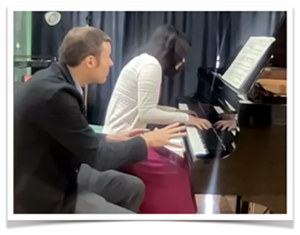 This helps to maintain a light, playful character rather than introduce a louder, heavier sound. He stressed that many chromatic passages or arpeggios can be played lighter, “more loosely.” He coached, “think of these and many other passages as being one long slur. When the mood shifts, hold back a bit as you ‘turn the page’ of the story. Bring out little details to suggest greater intimacy. After Vivian replayed a large section, he exclaimed, “I love how you let this flow. It was beautiful.” Marvelous playing, Vivian!
This helps to maintain a light, playful character rather than introduce a louder, heavier sound. He stressed that many chromatic passages or arpeggios can be played lighter, “more loosely.” He coached, “think of these and many other passages as being one long slur. When the mood shifts, hold back a bit as you ‘turn the page’ of the story. Bring out little details to suggest greater intimacy. After Vivian replayed a large section, he exclaimed, “I love how you let this flow. It was beautiful.” Marvelous playing, Vivian!
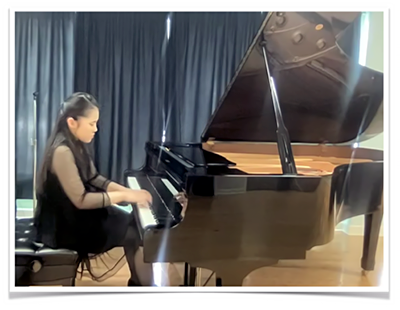 Jingyuan Zheng, student of Stella Xu, performed Frédéric Chopin’s Scherzo No. 4 in E Major, Op. 54. “An excellent performance. You captured the spirit and character, had good sound quality, and your music flowed,” Mr. Wunsch commented. He spoke with Jingyuan about Chopin and how he loved the key of E major. To Jing, the key suggested brightness, sparkle, yellows and greens. Mr. Wunsch suggested thinking of the outdoors, the breezes, and how the music glides without emphasizing beats. “You want to sparkle,” he agreed.
Jingyuan Zheng, student of Stella Xu, performed Frédéric Chopin’s Scherzo No. 4 in E Major, Op. 54. “An excellent performance. You captured the spirit and character, had good sound quality, and your music flowed,” Mr. Wunsch commented. He spoke with Jingyuan about Chopin and how he loved the key of E major. To Jing, the key suggested brightness, sparkle, yellows and greens. Mr. Wunsch suggested thinking of the outdoors, the breezes, and how the music glides without emphasizing beats. “You want to sparkle,” he agreed.
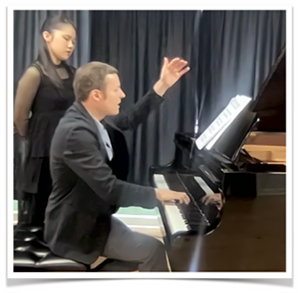 Mr. Wunsch’s comments focused on conveying playfulness in the opening and closing presto sections and more serious feelings in the middle section. He appealed to Jingyuan’s imagination, advising her to keep the tempo and pay attention to surprises in the score. To avoid unwanted accents, particularly with repeated staccato notes, stay close to the keys. That technique also promotes rhythmic precision. With the change of pace in m. 60, make it more of a gesture; make it different. In mm. 66-72, sweep up and down the keyboard with the right hand and project the melody in the left hand. In mm. 98-108, think of the sweeping eighth note passage in the right hand as an improvisation, and project the melody in the left hand. In m. 132, a homophonic passage, project the top voice. He called for more freedom, more ebb and flow.
Mr. Wunsch’s comments focused on conveying playfulness in the opening and closing presto sections and more serious feelings in the middle section. He appealed to Jingyuan’s imagination, advising her to keep the tempo and pay attention to surprises in the score. To avoid unwanted accents, particularly with repeated staccato notes, stay close to the keys. That technique also promotes rhythmic precision. With the change of pace in m. 60, make it more of a gesture; make it different. In mm. 66-72, sweep up and down the keyboard with the right hand and project the melody in the left hand. In mm. 98-108, think of the sweeping eighth note passage in the right hand as an improvisation, and project the melody in the left hand. In m. 132, a homophonic passage, project the top voice. He called for more freedom, more ebb and flow.
 In the melodious middle section, marked Più lento, we are reminded of the Bel canto opera Chopin adored, with the singer accompanied by the orchestra. Here, Aaron Wunsch commented, the melody in the right hand should be projected with a quality different from that of the accompanying bass. He asked if the singer was “singing out or singing in,” referring to declamation or introspection, again addressing interpretation. He marveled at the descending treble scale in m. 462, “a haunting from the past that gives you the shivers.” Then in m. 433, the treble thirds and sixths in bel canto is for duo, and the singing is “singing out.” Jingyuan garnered praise for her skill and overall interpretation from the master teacher.
In the melodious middle section, marked Più lento, we are reminded of the Bel canto opera Chopin adored, with the singer accompanied by the orchestra. Here, Aaron Wunsch commented, the melody in the right hand should be projected with a quality different from that of the accompanying bass. He asked if the singer was “singing out or singing in,” referring to declamation or introspection, again addressing interpretation. He marveled at the descending treble scale in m. 462, “a haunting from the past that gives you the shivers.” Then in m. 433, the treble thirds and sixths in bel canto is for duo, and the singing is “singing out.” Jingyuan garnered praise for her skill and overall interpretation from the master teacher.
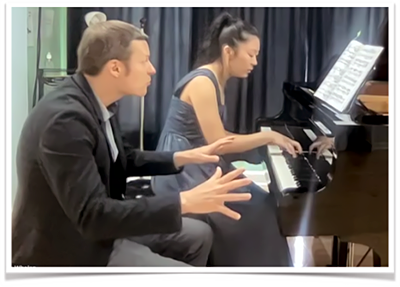 Christina Wang, student of Stella Xu, performed William Bolcom’s The Garden of EdenSuite: III. The Serpent’s Kiss, (Rag Fantasy). Herrollicking performance of this showpiece almost had the entireaudience stomping. Mr. Wunsch reminded us of the things thatinfluenced Bolcom: Scott Joplin and his Maple Leaf Rag, with its syncopated rhythms, theinfluences of African American music along with the rousing John Philip Sousa ABA march forms. He also cited Joplin’s opera Treemonisha, with its reference to superstition,the supernatural, and goodand evil. ”Captivate us with the serpent’s seductive nature,” he coached. “But this is a sly, sneaky serpent, so maintain good humor.”
Christina Wang, student of Stella Xu, performed William Bolcom’s The Garden of EdenSuite: III. The Serpent’s Kiss, (Rag Fantasy). Herrollicking performance of this showpiece almost had the entireaudience stomping. Mr. Wunsch reminded us of the things thatinfluenced Bolcom: Scott Joplin and his Maple Leaf Rag, with its syncopated rhythms, theinfluences of African American music along with the rousing John Philip Sousa ABA march forms. He also cited Joplin’s opera Treemonisha, with its reference to superstition,the supernatural, and goodand evil. ”Captivate us with the serpent’s seductive nature,” he coached. “But this is a sly, sneaky serpent, so maintain good humor.”
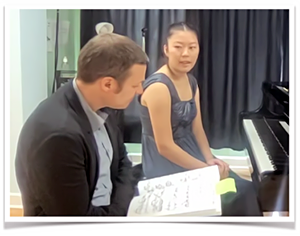 Christina earned Mr. Wunsch’s praise but also inspired some suggestions. Regarding repeated keys: “They are dangerous on the piano, and could sound like a woodpecker!” Again, he reminded the pianist to stay closer to the keys and repeat them without letting the key fully rise. Similarly, when you play the chord as a tremolo, replay keys before they rise fully. When a fp marking appears in a piano section, keep the louder notes in the mf range, just to give it emphasis. Think about suffusing the bass with mystery. He demonstrated how projecting the chord changes in the right hand can be more effective than articulating individual passage notes. Mr. Wunsch also commented approvingly on Christina’s use of the swing rhythmic style and her rhythmic hand taps on the opened fallboard. He did ask her about whistling as noted in the score. When playing octaves, he recommended relaxing the thumb, (have a loose thumb) and projecting the top voice.
Christina earned Mr. Wunsch’s praise but also inspired some suggestions. Regarding repeated keys: “They are dangerous on the piano, and could sound like a woodpecker!” Again, he reminded the pianist to stay closer to the keys and repeat them without letting the key fully rise. Similarly, when you play the chord as a tremolo, replay keys before they rise fully. When a fp marking appears in a piano section, keep the louder notes in the mf range, just to give it emphasis. Think about suffusing the bass with mystery. He demonstrated how projecting the chord changes in the right hand can be more effective than articulating individual passage notes. Mr. Wunsch also commented approvingly on Christina’s use of the swing rhythmic style and her rhythmic hand taps on the opened fallboard. He did ask her about whistling as noted in the score. When playing octaves, he recommended relaxing the thumb, (have a loose thumb) and projecting the top voice.
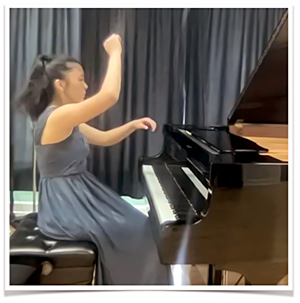 Another strategy he offered was to start the section in thirds not too slowly, so there would be room to gradually ritard further. Return to the recap at the same speed as the beginning pulse. In some places, when the harmony shifts, play more slowly. Near the end of the piece, play the totally weird chords as if you are flopping your hands on the keys. Mr. Wunsch coached Christina to reserve her loudest and wildest playing for the section following the score instructions: Now! Let Go!
Another strategy he offered was to start the section in thirds not too slowly, so there would be room to gradually ritard further. Return to the recap at the same speed as the beginning pulse. In some places, when the harmony shifts, play more slowly. Near the end of the piece, play the totally weird chords as if you are flopping your hands on the keys. Mr. Wunsch coached Christina to reserve her loudest and wildest playing for the section following the score instructions: Now! Let Go!
Aaron Wunsch, Danette Whelan, and Lisa Casia praised the performers, who received MEA Young Artist certificates for their outstanding achievements.
Bertha Mandel, writer
Lisa Gonzalez, screen shots, layout